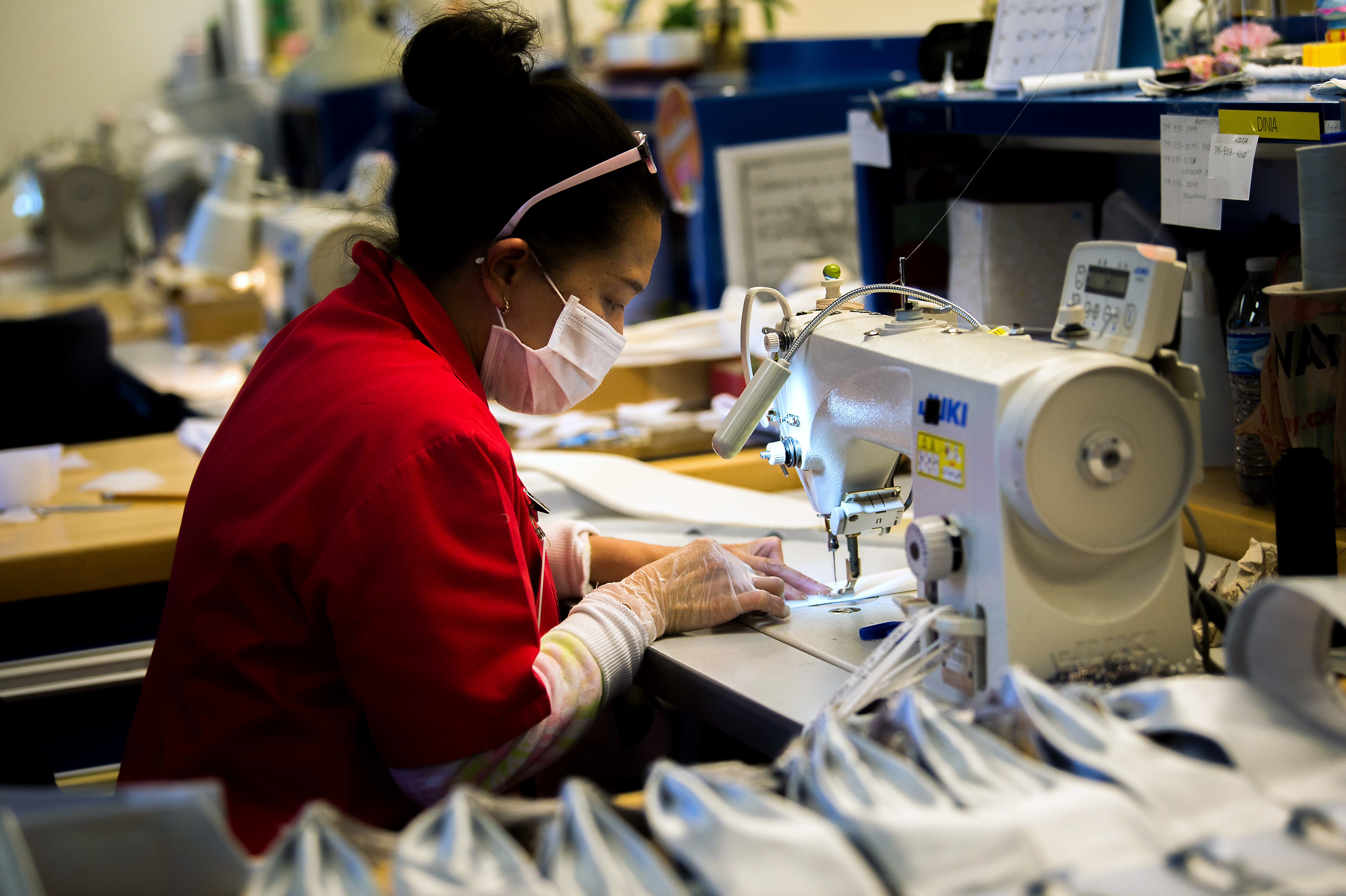It was an unusual Easter Sunday in America. Due to the spread of COVID-19 and the various restrictions on social gatherings, churches across the country were pressed to explore a range of innovative alternatives—whether moving services online, offering curbside Communion, or hosting drive-in gatherings in church parking lots.
For others, it was an opportunity to focus more closely on the physical needs of their communities. At Crossroads Church in Bluefield, West Virginia, congregants spent the day serving local healthcare workers, using 3-D printers to create face masks, shields, and other materials.
According to The Washington Post’s Sarah Pulliam Bailey:
On Sunday, each of the 25 volunteer groups were family units already in quarantine together. The facility was sanitized on Saturday, and everyone entering the facility put on gloves and a mask. When their shift was over, stations were sanitized before the next group took over.
The church made sure the designs for the PPE met the hospital’s needs and government guidelines. Families took one-hour shifts to produce hundreds of masks, gowns and face shields and plan to deliver the finished products to the hospital on Monday.
The families produced the PPE inside a local makerspace, a community-operated space that houses 3-D printers, laser cutters, sewing machines and vinyl cutters, many of which were donated by church members.
The church’s pastor, Travis Lowe—a leader in the faith-and-work community and a contributor to the Acton Powerblog—organized the event after a series of discussions with the Department of Health and Human Services and a regional hospital:
Ahead of Easter, [Lowe] contacted Tim Bess, executive vice president of operations of Bluefield Regional Medical Center, to ask whether he needed PPE in case the coronavirus were to spread in Mercer County, an economically depressed area of West Virginia that has struggled with the opioid epidemic.
“I said, ‘Are you kidding me? This is unbelievable,’” Bess said. “We need these desperately.”
The 93-bed hospital could serve up to 40,000 people in the surrounding area. On Friday, the county had four positive COVID-19 cases with one patient in the hospital, according to Bess, and no one knows when cases will peak in the region or how much equipment the hospital will need.
Like many coal-mining towns, Bluefield has undergone significant economic distress and outward migration. Since the 1980s, the population of Mercer County has dwindled from 100,000 to less than 20,000. In recent years, Crossroads has worked to curb this decline and offer support, hosting gatherings with local business leaders, which eventually led to a formal network focused on reinvigorating the city’s economy and boosting human capital.
Amid the new threat of COVID-19, Crossroads was well positioned to respond, leveraging local expertise and its own institutional infrastructure to provide targeted support. For example, the facility where masks and materials were assembled is run by Crea Company, a community collective overseen by Lowe and another local pastor, Robbie Gaines. Founded as part of past economic initiatives, the company aims to bring together craftspeople to create “a movement of ‘Make + Believe’ that inspires hope in our community and region.” As Bailey explains:
The company sells memberships to people who want to use the space for prototyping or crafting. It has 20 members so far, including a graphic artist, who printed six-inch prototypes of seats planned for the renovation of a local theater.
Lowe, who considers himself “pretty good at the computer but not artistic,” said he got into the makerspace business because he thought it would be a good way to help the local economy. The idea, he said, is to ultimately help other businesses get off the ground.
But the growing need for gear for health-care workers opened up a new opportunity for the facility. Lowe said he started making masks when he saw people who also have makerspaces were making them all over the country.
“I would print out a couple masks and give them to people I knew,” he said “We never imagined this, and then we were positioned pretty well.”
It’s an inspiring story, demonstrating the transformative role that local institutions can play in times of crisis. But it also reminds us that institutional strength isn’t just a matter of physical or organizational readiness. As with Crossroads’ previous economic initiatives, the latest effort is a simply a byproduct of their theology of work, as well as an overarching vision for the church’s social responsibility.
As Lowe explained to me in a personal email exchange:
We think our church, as well as our lives, should be a gift to our community. The gift that our community currently needs is PPEs, so we responded. We have always looked for places where we could work for the flourishing of Bluefield.
When our businesses were struggling, we did this through hosting business owner round tables. When grief has been heavy in our community, we hold prayer vigils. We do not see the community’s needs has being divided between spiritual and physical or sacred and secular. We just try to minister to the needs of our community, whatever those needs are.”
Like Crossroads, communities across America continue to combat this crisis in targeted, creative ways—leveraging local relationships and individual expertise to meet immediate needs and implement innovative solutions. While the political solutions will ebb and flow, we can be encouraged by the slow, steady, and enduring work among local enterprises and institutions.
As Lowe wrote several years ago, reflecting on his church’s response to Bluefield’s past economic crisis: “This is all happening because we recognize that we have been sent to a place and are prayerfully working to see transformation … The road is still long and the way will not be easy, but we have been sent here and are here to stay.”
(Photo credit: U.S. Air Force / Trevor Cokley. Public domain.)

